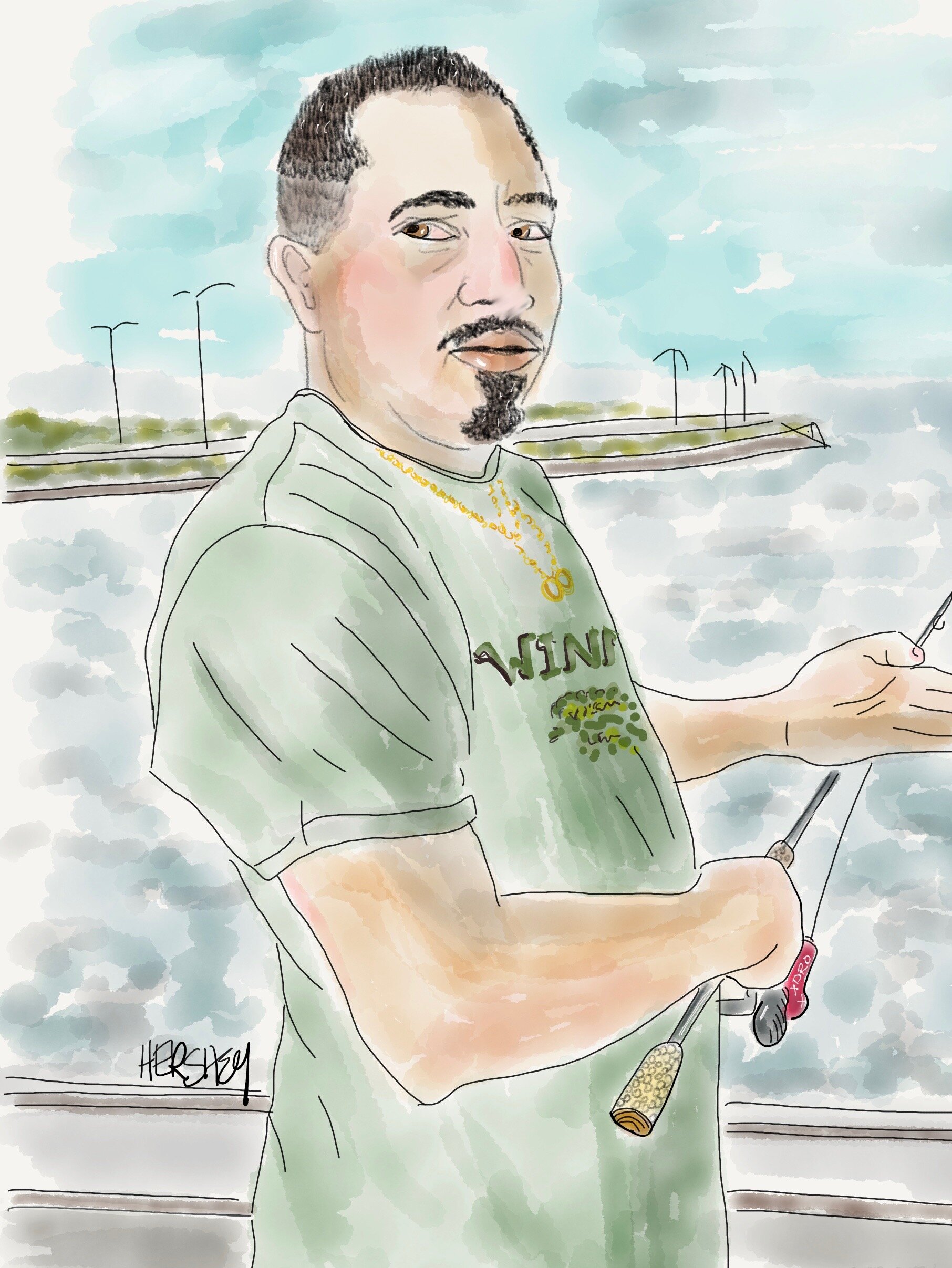“I come after the grande hurricane...10 yrs ago.....from Guatemala . I fish for mi familia every day from aqui.” Drawing by Jennifer Hershey. Follow her on Instagram at deeofo.
The Amtrak Crescent from New York City to New Orleans is a small and somewhat understaffed train. Given their size and cultural stature, it seems like the Big Apple and the Big Easy deserve something more robust, if not all of America. Train travel is low carbon, pleasant, and offers so many other benefits to our transportation system. Apparently few people train between these cities (at least in the dead space of early February before Mardi Gras), so the train not only was small (9 cars total), it was challenging in its lack of basic amenities. Dining cars have been replaced by a limited option of previously prepared food that wears quite thin after a few meals. Bathrooms are few and poorly cleaned. There was no observation car. Yet - as always - I was appreciative of Amtrak’s efficient and inexpensive roll-on bike service. It is both easy and a joy to use. You roll your bike to a baggage car, remove your gear, and hand over your bike to an attendant. When you arrive at your destination, you do the same thing in reverse. Retrieving your bike takes minutes, and after restoring your gear, off you ride.
Jenny Hershey with her gear standing beside our bikes as we board in NYC.
I don't always make New Year’s resolutions, but this year I did: “Observe more, judge less”. It was simple once I said it out loud, although I had been struggling to articulate the thought to myself for quite a while. In addition to an unusual bout of self-reflection inspired by the quick and successive deaths of both my parents, I’d been reading the fascinating book “Why We Are Polarized” by Ezra Klein; a look behind the extreme politicized polarization plaguing America.
The Cathedral in Jackson Square, New Orleans, LA
I was coming to understand that just as we hide parts of ourselves from those we love, we are hidden from one another in a country we love, partly because we assume others should see the world as we do even if we cannot see the same world they do. I had been unsettled by several attacks on FaceBook about my apparent ignorance of the South based on a few inquisitive posts about life in North Carolina. Out of defensiveness, I found myself questioning how much conservative southerners understand, or care to understand, about my identity as a multicultural urban northern liberal. Conversely, I was forced to admit to myself that I knew, or cared, equally little about the identity of white rural southern conservatives.
Oil plant just northeast of NOLA on the Mississippi River.
In anticipation of this trip, both my traveling partner Jenny and I felt trepidation about biking in the Deep South. I hoped Klein’s book would help me frame an approach that would go beyond my own self-perceived static and somewhat predictable liberal perspective. It has not disappointed me.
Just east of NOLA off the Mississippi River levee. Quite alive.
A dead fox. Roadkill.
I admit that we partly chose to explore Louisiana and Texas on bikes because it is a warm place to go in early February. In addition, it is accessible by train (we thought other choices would be more carbon intensive, and low carbon travel is part of our objective). But our country's current form of political polarization also begs for greater interaction between our vastly different political cultures. Interestingly, as a northerner, I often feel greater affinity with European countries and cultures than I do with the political and social cultures of the American south. But since the 2016 election, I’ve come to believe that America is in need of a giant reset (or “rebooting”) and that if I - and other people like me (i.e., members of my group) - don’t grapple with our entire American identity, we are very likely to misunderstand how we arrived at, and might get out of, such a highly polarized present moment.
Near Donaldsville, LA.
My interest in climate change is a case in point. There’s so much about our changing climate that seems obvious to me that I simply cannot fathom the abyss in logic or understanding between me and climate deniers. While I’m very confident the science supports me, I’m learning that facts alone don’t change behavior. Even in an area devastated by Hurricane Katrina, and after numerous recent warnings that the sea level is especially troublesome on the Gulf Coast, plenty of locals remain willfully cavalier, if not downright defiant about taking action.
“I was 13....they took us out by boat. I slept on a bridge for a week with my Grandma. “ Drawing by Jennifer Hershey. Follow her on Instagram at deeofo.
Ezra Klein makes the same argument about rationalizing, or recasting, facts within political cultures. Essentially, his fundamental point is that identity is a far more important driver of political viewpoints than is logic or “facts”. In fact, logic may be the least important attribute of political identity - far less important than cultural, familial, socioeconomic and racial identity. I’m reminded of James Carville’s famous quip during the Clinton administration, “it’s the economy, stupid”. Maybe in the age of Trump, “it’s the tribe, stupid”.
A petrochemical plant just outside the bayou town of Donaldsville, LA.
Stupid, perhaps, but true nonetheless. And so very, very human. So, I’ve decided - and Jenny agrees - that the most useful way to explore Louisiana and Texas right now is to observe more, and judge less. For readers who hope we will brightly burn the climate emergency torch with the message that the apocalypse is well upon us and our southern neighbors need to wake up lest they suffer sooner than their northern neighbors (even though we think that’s true), we may disappoint you. Our agenda right now is simply to understand.
“Yes Ma’am...they got all kinds of plants here. Chemicals and oil and I don’t even know what they got. “ Drawing by Jennifer Hershey. Follow her on Instagram at deeofo.
Maybe a lot of folks just don’t believe that good jobs from a “green economy” will really show up when chemicals and oil companies have been the only big games in town for multiple generations. Or maybe they just don't feel like they can change anything anyway.
Bayou Country about 150 miles southwest of New Orleans.
We talked to a middle aged black man in White Castle, Louisiana, named Orville outside the local grocery store, who told us he had voted for Obama but didn't vote in 2016, and was probably not going to vote in the next election also, even though he thinks Trump is a crook. When we asked him why, he went silent. So we (thoughtful northerners that we are) explained “logically” why he should - since the federal voting power for a Democrat in Louisiana is arithmetically more powerful, given the Senate and the Electoral College, than a vote by a Democrat in New York. Orville looked dubious and replied, “them politician’s all gonna do what they want to anyway.” Jenny and I exchanged glances. We had failed to convince him. So, as we mounted our bikes and road off, Jenny yelled back at Orville, “If you don’t vote in the next election, I’ll come back here and kick your ass”! Orville laughed. Maybe he’ll remember that part of our conversation more then our logic.
Tractor in a fallow sugar cane field near Baldwin , LA. Photo by Jennifer Hershey.
Maybe Orville is right. Yet, Congressional behavior during the impeachment proceedings teaches us that politicians will do just about anything they think the majority of their constituents want them to (with a few exceptions). And maybe that’s a good thing, especially if we want them to do what’s right. But more agreement on what “right” looks like among us constituents would be very helpful, especially when the prevailing view seems so very wrong. And how will we achieve that? I used to think I knew. Now I no longer do… so for myself, I'm trying out the follow idea: Observe more, judge less. And please know, dear reader, it's myself that I am encouraging.
For those of you who geek out on map routes, here are the last four days of our rides on Garmin: Day One, Day Two, Day Three, Day Four.
Thanks for reading! More to come…
All photos, unless credited or otherwise noted, are copyrighted property of the blog post author.












